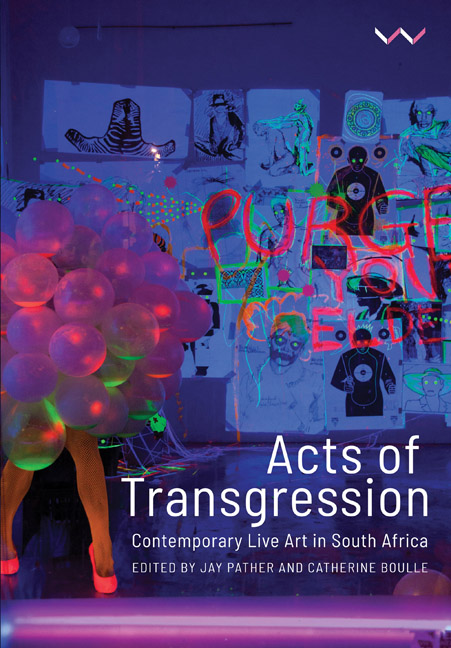Book contents
- Frontmatter
- Contents
- Acknowledgements
- Introduction
- PART ONE LIVE ART IN A TIME OF CRISIS
- PART TWO LOSS, LANGUAGE AND EMBODIMENT
- 5 Corporeal HerStories: Navigating Meaning in Chuma Sopotela's Inkukhu Ibeke Iqanda through the Artist's Words
- 6 ‘A Different Kind of Inhabitance’: Invocation and the Politics of Mourning in Performance Work by Tracey Rose and Donna Kukama
- 7 State of Emergency: Inkulumo-Mpendulwano (Dialogue) of Emergent Art When Ukukhuluma (Talking) is Not Enough
- 8 Space is the Place and Place is Time: Refiguring the Black Female Body as a Political Site in Performance
- PART THREE RETHINKING THE ARCHIVE, REINTERPRETING GESTURE
- PART FOUR SUPPRESSED HISTORIES AND SPECULATIVE FUTURES
- Contributors
- List of Illustrations
- Index
6 - ‘A Different Kind of Inhabitance’: Invocation and the Politics of Mourning in Performance Work by Tracey Rose and Donna Kukama
from PART TWO - LOSS, LANGUAGE AND EMBODIMENT
Published online by Cambridge University Press: 30 May 2019
- Frontmatter
- Contents
- Acknowledgements
- Introduction
- PART ONE LIVE ART IN A TIME OF CRISIS
- PART TWO LOSS, LANGUAGE AND EMBODIMENT
- 5 Corporeal HerStories: Navigating Meaning in Chuma Sopotela's Inkukhu Ibeke Iqanda through the Artist's Words
- 6 ‘A Different Kind of Inhabitance’: Invocation and the Politics of Mourning in Performance Work by Tracey Rose and Donna Kukama
- 7 State of Emergency: Inkulumo-Mpendulwano (Dialogue) of Emergent Art When Ukukhuluma (Talking) is Not Enough
- 8 Space is the Place and Place is Time: Refiguring the Black Female Body as a Political Site in Performance
- PART THREE RETHINKING THE ARCHIVE, REINTERPRETING GESTURE
- PART FOUR SUPPRESSED HISTORIES AND SPECULATIVE FUTURES
- Contributors
- List of Illustrations
- Index
Summary
The sanctioned disposal of Patrice Lumumba, whose figure constituted for some a Cold War threat to western political and economic interests in the newly independent Congo, involved nothing less than the planned and comprehensive elimination of an offending body. With the tacit support of the United States's Central Intelligence Agency (CIA) and the United Kingdom's Secret Intelligence Service, MI6, Lumumba and his ministerial colleagues, Maurice Mpolo and Joseph Okito, were tortured and summarily executed on 17 January 1961. Four days later, Belgian police commissioner Gerard Soete and his brother Michel dismembered the bodies and dissolved them in sulphuric acid in an effort to eliminate all trace of the corpses. Extending to its limit the semantic operation of assassination, enacted in this systematic dismemberment and erasure was what Adriana Cavarero might describe as a physical as well as ontological violence of attempted human nullification.
Whilst on a residency in Brussels in 2015, artist Tracey Rose enacted a commemorative performance titled Die Wit Man (‘The White Man’), marking the 55th anniversary of Lumumba's death. Writing about the work, Sean O'Toole reflects, ‘How do you mourn a life that was not just snuffed out but purposefully disappeared with corrosive acid?’ For Rose, this demanded a form of ritual incantation, a persistent pronouncement of the name ‘Patrice Lumumba,’ repeated over 600 times by the artist whilst journeying on foot from the WIELS Centre for Contemporary Art to the Church of Our Lady of Laeken, home to the Belgian royal family crypt.
The seven-kilometre route of this subversive pilgrimage was made arduous, not only on account of the distance covered and the ongoing litany of Rose's vocal announcement, but also because of the laden trolley she pulled along the way. Loosely recalling the kinds of floats and processional statues held aloft in Catholic celebrations of saints and martyrs, propped up in this makeshift trolley was a crude wooden effigy of stumps and branches, an arcane cipher for Lumumba himself, who has, despite his physical nullification, attained for many an iconic status. For artist Tshibumba Kanda-Matulu, he was the ‘Lord Jesus of Zaire.’ And as Sean Jacobs observes in a more contemporary moment, ‘Lumumba today has tremendous semiotic force: he is a social media avatar, a Twitter meme and a font for inspirational quotes – a perfect hero (like Biko), untainted by any real politics.’
- Type
- Chapter
- Information
- Acts of TransgressionContemporary Live Art in South Africa, pp. 124 - 147Publisher: Wits University PressPrint publication year: 2019



